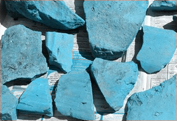
The
archaeologists are quite convinced now that there was a large bathhouse in Wigan in the
Roman period dating to the mid 2nd century AD. The confirmation comes with the discovery
of a stoke-hole connected to the hypocaust. In addition a further two hypocaust rooms have
been unearthed together with what the experts believe was a plunge pool. Ian Miller the
site director says he is overwhelmed by the quantity and quality of the finds from the
excavations which include over 2000 shards of Roman pottery (many of the
shards are of high status Samian ware) and 1.5 tons of building material. The stone
walling, most of which has unfortunately been ‘robbed out’, was in some cases
over one metre thick suggesting the building complex was at least two storeys high.

The archaeologists also now believe that the bathhouse complex was connected to a much
larger building which had a colonnade running around it. In fact a column capital, which
could have originated from it, has been found in the debris of the hypocaust. The full
extent of this building is not known as Victorian cellars have destroyed the remains on
the east side. There is still no evidence for its function but the discovery of a series
of beam-slot foundation trenches for dividing walls
suggests it was most likely a Mansio (or Roman hotel). A deep channel running north-south on the west side of the complex is
thought to have carried water to the site. Also, just to the north of the colonnaded
building, an earlier workshop has been discovered with a series of hearths
where
lead was being process. It all adds weight to the bathhouse theory as much lead is used in
these buildings for such things as piping and a pool lining (as at the Roman baths in
Bath).
Other significant finds include a medieval pit with pottery dating to the 13th century,
and a bread oven dating to the 18th century (although some wit has suggest it was more
likely a pie oven). The archaeologists have finished their work now and soon the whole
area will disappear under a multi-storey car park. But all is not lost. All the tiling
from the hypocausts has been collected and Shepherds, the developer, are keen on the idea
of a reconstruction in the new shopping centre when it opens in 2007. 
This picture shows an overview of the whole site. Click the
thumbnail for bigger picture.

Summer trip
This year the trip will be on Sunday 7th August with a visit to the current excavations
being carried out on the Amphitheatre at Chester.
In April, Dan Garner gave us a fascinating talk on the developments there and broke the
news of the discovery of a double phase when the site was extended with an extra outer
wall. Excavations continue this summer and Dan will be giving us a guided tour of further
developments. Additionally, in the morning, we will be treated to a tour of the
Heronbridge site just south of Chester where Chester Arch Soc has been researching a
multi-period site. This was the subject of the spring CBA NW conference which proved to be
very entertaining. The site is situated just north of Eccleston and comprises a Roman
settlement straddling the Roman Road into Chester. Adjacent is a huge Dark-age enclosure.
In the 1930’s a mass war-grave was discovered here which has recently been dated to
the early 7th century. If you are interested in going on the trip please fill in the
enclosed slip.
Greatacre
At last month’s meeting Tom mention we had received information about a possible
site near Greatacre in the Douglas valley. The story is that an allotment owner discovered
something quite deep when he was digging a well. He thought it was a lead coffin and so
covered it up as fast as he could and told his son not to tell anybody. Thirty years
later, with his father long gone and the discovery of Roman remains in the town centre,
his son’s curiosity has got the better of him. We have visited the site and found out
that United Utilities are currently installing sewerage overflow tanks in the area. These
will not interfere with the site but they have kindly agreed to help us with our
investigations with the loan of an excavator.
Next Meeting
Wednesday 1st June at the Baden Powell Centre (Scout HQ) in Greenough
Street, starting at 7.30 pm as usual. This month our speaker was to be Anne Worsley with a
talk on Forensic Archaeology. Unfortunately due to ill health Anne has had postpone her
visit till later in the year. Instead, Jack Smith has kindly offered to
bring is talk forward which is on his research into Secondary or “B”
Roads in the Roman North West.
Hope to see you there. B.A.
|



